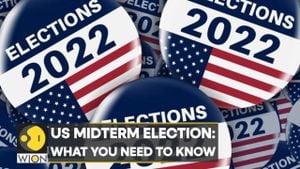Donald Trump has once again claimed victory, returning to the White House for his second term after what many are calling one of the most contentious elections in American history. Following his surprising win over Vice President Kamala Harris, Trump is expected to implement policies steeped in the strongman tactics he honed during his first administration. With his unique brand of governance, characterized by divisive rhetoric and aggressive promises, Trump stands poised to reshape the U.S. political and social landscapes significantly.
After defeating Harris, who many presumed would become the first female U.S. president, Trump remains the only president to have been convicted of crimes during his tenure and still returned to power. This new administration is set against the backdrop of historical political shifts and renewed grievances among the electorate. The controversial leader's strategies paid off well at the polls, where his party managed to flip key battleground states and solidify its dominance.
Trump's campaign was fueled by discontent with the status quo and economic anxieties heightened by inflation. His message, which leaned heavily on promises of mass deportations, economic regeneration through tax cuts, and strict immigration controls, reverberated with voters feeling the pinch of rising costs and uncertain futures. He also cultivated support among unexpected demographics, including African American and Latino communities, by framing immigration as both a criminal issue and a threat to jobs.
The election outcome wasn’t merely about policies but the resurrection of Trump's combative style, which many voters find appealing amid societal chaos. During his victory speech, Trump declared, "America has granted us an unprecedented and powerful mandate," signaling readiness to wield significant influence from day one. He vowed to keep his promises and transform grievances against the political establishment and his opponents from words to policy actions.
Many political analysts suggest this victory evolves from the systematic training of his base, marked by the erosion of faith in institutions, such as the media and justice system. Trust had dwindled during Biden's administration, with nearly half of the voters expressing skepticism about democracy's effectiveness, indicating how well Trump’s narrative of dissatisfaction took root. The political climate, shaped by distrust and anger, laid fertile ground for Trump’s resurrection.
Critics of Trump express concern following this election, highlighting the potential for authoritarian governance as he curtails the independence of the Department of Justice and pushes back against institutional checks on his power. Opponents warn against the dangers of his planned military deployments against dissenters and sweeping federal job cuts aimed at public officials he views as adversaries.
Trump’s agenda appears laden with radical promises, such as mass deportations and tackling the perceived threats posed by Democrats. His insistence on labeling those charged with the January 6 Capitol insurrection as “political prisoners” is just one example of how he aims to reshape public narratives around his tenure and rallies his base around collective grievances against his political rivals.
Curiously, many voters, even those who expressed dissent against powerful figures, have failed to see the troubling pattern evident post-Trump’s previous presidency. Critics of Trump argue strength and efficacy were symbolized by his willingness to speak bluntly, even when darkly absurd. They believe this election illuminated America’s increasingly polarized and hostile political climate, where social standards once deemed unacceptable seem to be pushed aside.
The tumultuous nature of this election extended beyond Trump himself. The Democratic Party found itself grappling with disenfranchised constituents. Harris, who campaigned staunchly for democracy and civil rights, might have been too caught up defending the legacy of the Obama-Biden administration rather than addressing the very real issues facing average Americans.
Some voters chose Trump, fully aware of his history, believing his promises might still deliver results where others had failed. The shift of traditionally blue states toward Trump signifies not only growing acceptance of his methodologies but also highlights how he managed to redefine the political frontier. His achievements at the polls show how deeply ingrained his talk of populism had permeated the hearts and minds of voters.
While Trump’s return signals a significant victory for his supporters and the Republican Party, it leaves many observers wondering what lies ahead for the country. The normalization of extreme partisanship, where longstanding traditions of executive accountability could potentially erode, raises questions about America's future.
Politics, once characterized by debate and collaboration, now appears set along clearer lines of conflict. The enthusiastic applause from Trump's supporters during his victory party stayed true to the narrative they embraced — one of retribution against perceived enemies of America. Trump's approach feeds on the fears, anger, and frustrations of voters, coalescing them around the notion of ‘making America great again’ as deeply intertwined with their personal identities.
The aftermath of this election will likely reverberate for years, potentially reshaping the very fabric of American democracy. Those who argue for the preservation of democratic norms now find themselves facing the reality of what it means when power consolidates within one individual, who campaigned heavily on erasing historical legacies and enfranchising ideals of loyalty over accountability.
Looking toward the future, the American political scene seems set for upheaval. Decisions taken under the Trump administration could change the course of governance, testing the boundaries of legality and civility. His statements about using military force against political foes and shifting the Justice Department policies are not merely rhetorical; they underline intentions to create paths to personal power masked as populist solidarity.
This past election marks the moment America collectively chose its path, and for many, it remains unclear whether this choice signifies demise or renewal. Amid the celebration for some, others mourn the apparent decline of democratic values — questioning if this is the new norm or the prelude to yet another political resurgence fueled by hope, fear, or, potentially, rebellion against growing authoritarianism.



